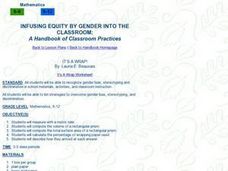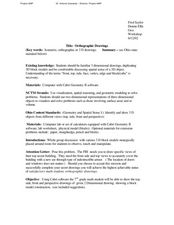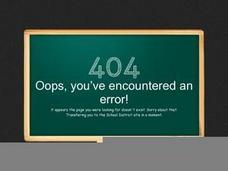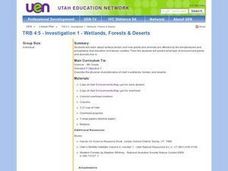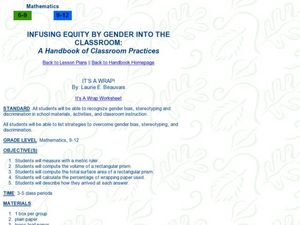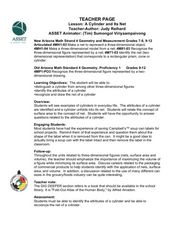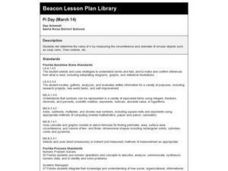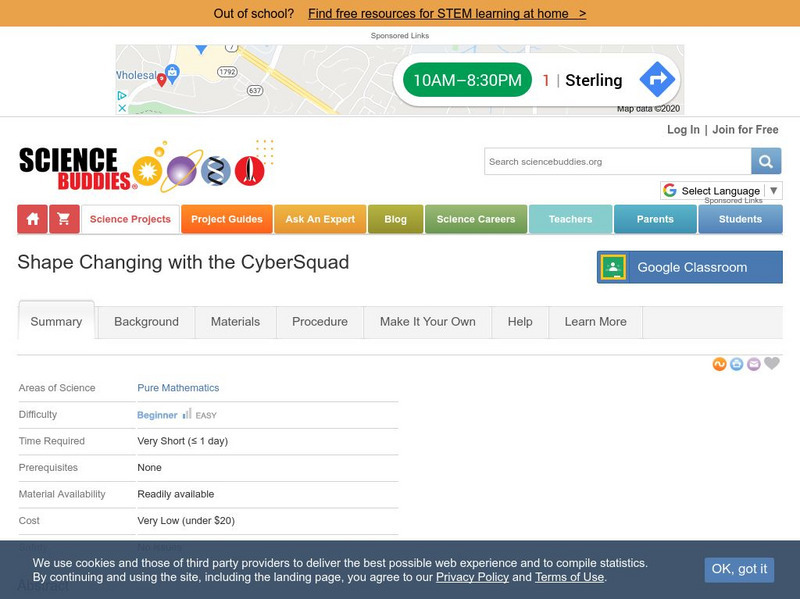Curated OER
Mathematics: It's a Wrap!
Students calculate the amount of wrapping paper needed to wrap boxes. They describe how they determined their answers.
Alabama Learning Exchange
Pennies, Pennies and More Pennies
Learners determine the number of pennies needed to fill a room. For this pennies lesson plan, students work in groups to determine the number of pennies needed to fill a room. They compute the probability of the head of a pin landing...
Curated OER
Watershed Investigations
Students explore the components of a watershed and the factors that affect it. They read a topographical map and use geometry to determine the area of a watershed. Students estimate the volume of a body of water and perform runoff...
Curated OER
Million Dollar Gift
Third graders create a box big enough to hold a million dollars. This is a project fun to do near the winter holidays with inexpensive gifts included in the boxes. This hands-on lesson very effectively demonstrates the concept of volume.
Curated OER
Water Treatment Plant Tour
Students define vocabulary related to geometry and calculate the volume. In this geometry lesson, students calculate flow rates, and volume as it relates to a water plant facility. They calculate the volume of three dimensional shapes...
Curated OER
Pape's Theorems
For this math worksheet, students find the length of the side of a regular hexagon whose area is numerically equal to its perimeter.
Curated OER
Design a Better Classroom Workplace
Students design a new classroom workplace. For this architecture lesson, students use area formulas to identify the problem with the existing desks in their classroom. Students design their own solution volume formulas to solve the...
Curated OER
Orthographic Drawing
Young scholars investigate orthographic drawings. In this geometry lesson, students identify properties of three dimensional drawings in space. They solve problems using volume and area formulas.
Curated OER
Travelogue of a Planet
High schoolers randomly select a planet, including Earth. They research key features of the planet including mass, volume, density, gravity, temperature, weather, geology, atmosphere, surface features, location from sun, Earth and other...
Curated OER
Investigation 1 - Wetlands, Forests & Deserts
Fourth graders examine surface terrain and how plants and animals are affected by the temperatures and precipitation that elevation and terrain creates. Then students predict what type of environment plants and animals live in.
Curated OER
Infusing Equity in the Classroom by Gender
Students investigate the idea of gender descrimination in the classroom. In this algebra lesson, students collect data in stereotyping, and gender bias in the classroom, school materials and activities. They graph and analyze their...
Curated OER
Using Concept Maps to Design 3D Spheres
High schoolers create three dimensional shapes using concept maps. In this geometry lesson, students investigate the impact of mental schemas on humans. They collect data on this topic and plot their data on a coordinate plane.
Curated OER
A Cylinder and Its Net
Young scholars sketch the nets for given polygons and cylinders. In this geometry lesson, students find the measurements that correspond with prisms, cones and cylinders. they identify parts of three-dimensional shapes.
Curated OER
Pi Day (March 14)
Fourth graders determine the value of ? by measuring the circumference and diameter of circular objects such as soup cans, Oreo cookies, etc..
Curated OER
Orthographic Drawings
Students investigate the creation of three dimensional drawings. In this geometry instructional activity, students analyze and complete orthographic drawings. They Cabri software to manipulate and move the drawings around.
Curated OER
Linear Equations
Ninth graders solve linear equations. For this Algebra I lesson, 9th graders investigate the properties of equations (Reflexive, Symmetric, Transitive, Substitution, and Transformation Properties) and use these properties to solve...
Science Buddies
Science Buddies: Shape Changing With the Cyber Squad
In this project, you will make 2-dimensional templates, called nets, that fold up into 3-dimensional (3-D) shapes. By making shapes of different sizes, you will be able to see how 3-D shapes change with size. In your findings you will...
Illustrative Mathematics
Illustrative Mathematics: 6.g Christo's Building
This problem looks at a scale model of a project by Christo and Jeanne Claude. Students are asked to calculate its volume, how many 1/2-inch blocks would be needed to build it, and how much cloth would be required to wrap it. They then...
Alabama Learning Exchange
Alex: Popcorn Bucket or Box?
In this exploration, students will apply their knowledge of finding volume and surface area of cylinders and rectangular prisms. Students will make recommendations to the local movie theater after determining which package is cost...
Alabama Learning Exchange
Alex: Nifty Nets
During this activity, students will create nets for prisms. They will find the volume and surface area of the shapes. They will also use interactive activities to review three-dimensional shapes.This lesson plan was created as a result...


